The Cambridge History of China. Vol. 06. Alien Regimes and Border States, 907-1368
Подождите немного. Документ загружается.

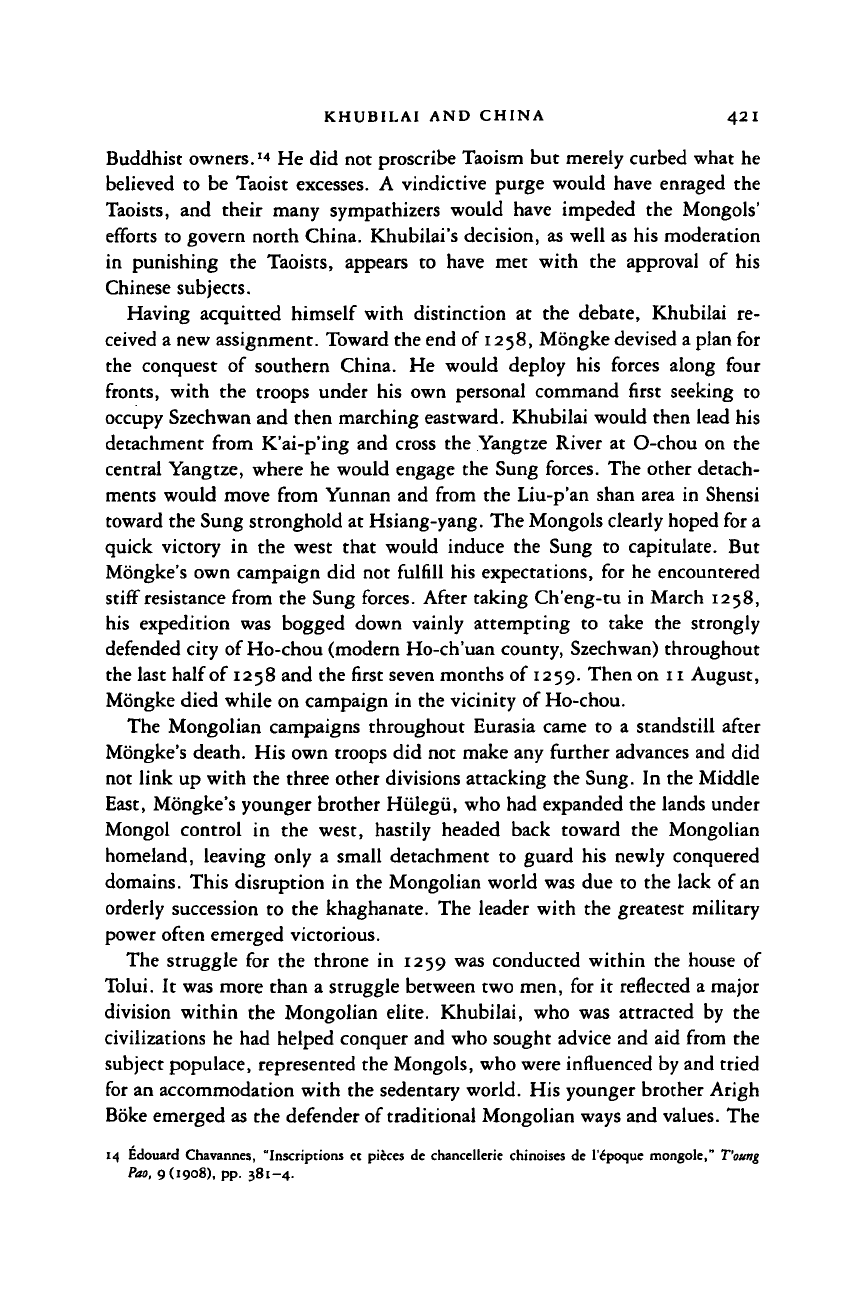
KHUBILAI AND CHINA 42 I
Buddhist owners."* He did not proscribe Taoism but merely curbed what he
believed to be Taoist excesses. A vindictive purge would have enraged the
Taoists, and their many sympathizers would have impeded the Mongols'
efforts to govern north China. Khubilai's decision, as well as his moderation
in punishing the Taoists, appears to have met with the approval of his
Chinese subjects.
Having acquitted himself with distinction at the debate, Khubilai re-
ceived a new assignment. Toward the end of 1258, Mongke devised a plan for
the conquest of southern China. He would deploy his forces along four
fronts,
with the troops under his own personal command first seeking to
occupy Szechwan and then marching eastward. Khubilai would then lead his
detachment from K'ai-p'ing and cross the Yangtze River at O-chou on the
central Yangtze, where he would engage the Sung forces. The other detach-
ments would move from Yunnan and from the Liu-p'an shan area in Shensi
toward the Sung stronghold at Hsiang-yang. The Mongols clearly hoped for a
quick victory in the west that would induce the Sung to capitulate. But
Mongke's own campaign did not fulfill his expectations, for he encountered
stiff resistance from the Sung forces. After taking Ch'eng-tu in March 1258,
his expedition was bogged down vainly attempting to take the strongly
defended city of Ho-chou (modern Ho-ch'uan county, Szechwan) throughout
the last half of 1258 and the first seven months of 1259. Then on 11 August,
Mongke died while on campaign in the vicinity of Ho-chou.
The Mongolian campaigns throughout Eurasia came to a standstill after
Mongke's death. His own troops did not make any further advances and did
not link up with the three other divisions attacking the Sung. In the Middle
East, Mongke's younger brother Hiilegii, who had expanded the lands under
Mongol control in the west, hastily headed back toward the Mongolian
homeland, leaving only a small detachment to guard his newly conquered
domains. This disruption in the Mongolian world was due to the lack of an
orderly succession to the khaghanate. The leader with the greatest military
power often emerged victorious.
The struggle for the throne in 1259 was conducted within the house of
Tolui. It was more than a struggle between two men, for it reflected a major
division within the Mongolian elite. Khubilai, who was attracted by the
civilizations he had helped conquer and who sought advice and aid from the
subject populace, represented the Mongols, who were influenced by and tried
for an accommodation with the sedentary world. His younger brother Arigh
Boke emerged as the defender of traditional Mongolian ways and values. The
14 Edouard Chavannes, "Inscriptions ec pieces de chancellerie chinoises de l'lpoque mongole," Voting
Poo,
9 (1908), pp. 381-4.
Cambridge Histories Online © Cambridge University Press, 2008
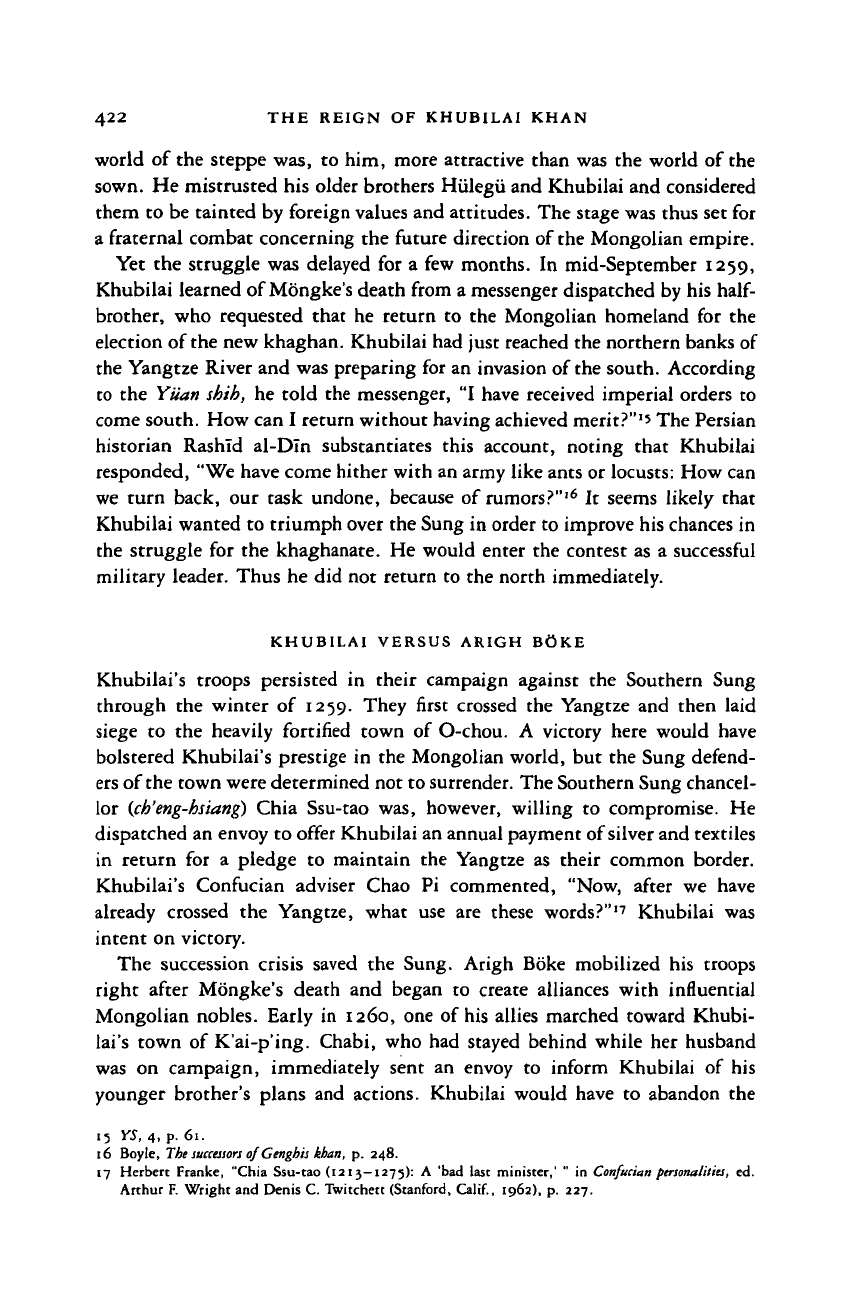
422 THE REIGN OF KHUBILAI KHAN
world of the steppe was, to him, more attractive than was the world of the
sown. He mistrusted his older brothers Hiilegii and Khubilai and considered
them to be tainted by foreign values and attitudes. The stage was thus set for
a fraternal combat concerning the future direction of the Mongolian empire.
Yet the struggle was delayed for a few months. In mid-September 1259,
Khubilai learned of Mongke's death from a messenger dispatched by his
half-
brother, who requested that he return to the Mongolian homeland for the
election of
the
new khaghan. Khubilai had just reached the northern banks of
the Yangtze River and was preparing for an invasion of the south. According
to the Yuan
shih,
he told the messenger, "I have received imperial orders to
come south. How can I return without having achieved merit?"
1
' The Persian
historian Rashid al-Din substantiates this account, noting that Khubilai
responded, "We have come hither with an army like ants or locusts: How can
we turn back, our task undone, because of rumors?"
16
It seems likely that
Khubilai wanted to triumph over the Sung in order to improve his chances in
the struggle for the khaghanate. He would enter the contest as a successful
military leader. Thus he did not return to the north immediately.
KHUBILAI VERSUS ARIGH BOKE
Khubilai's troops persisted in their campaign against the Southern Sung
through the winter of 1259. They first crossed the Yangtze and then laid
siege to the heavily fortified town of O-chou. A victory here would have
bolstered Khubilai's prestige in the Mongolian world, but the Sung defend-
ers of the town were determined not to surrender. The Southern Sung chancel-
lor
(cb'eng-hsiang)
Chia Ssu-tao was, however, willing to compromise. He
dispatched an envoy to offer Khubilai an annual payment of silver and textiles
in return for a pledge to maintain the Yangtze as their common border.
Khubilai's Confucian adviser Chao Pi commented, "Now, after we have
already crossed the Yangtze, what use are these words?"'
7
Khubilai was
intent on victory.
The succession crisis saved the Sung. Arigh Boke mobilized his troops
right after Mongke's death and began to create alliances with influential
Mongolian nobles. Early in 1260, one of his allies marched toward Khubi-
lai's town of K'ai-p'ing. Chabi, who had stayed behind while her husband
was on campaign, immediately sent an envoy to inform Khubilai of his
younger brother's plans and actions. Khubilai would have to abandon the
15 YS, 4, p. 61.
16 Boyle, The
successors
of Genghis khan, p. 248.
17 Herbert Franke, "Chia Ssu-tao (1213—1275): A 'bad last minister,' " in
Confucian
personalities,
ed.
Arthur F. Wright and Denis C. Twitchett (Stanford,
Calif.,
1962), p. 227.
Cambridge Histories Online © Cambridge University Press, 2008
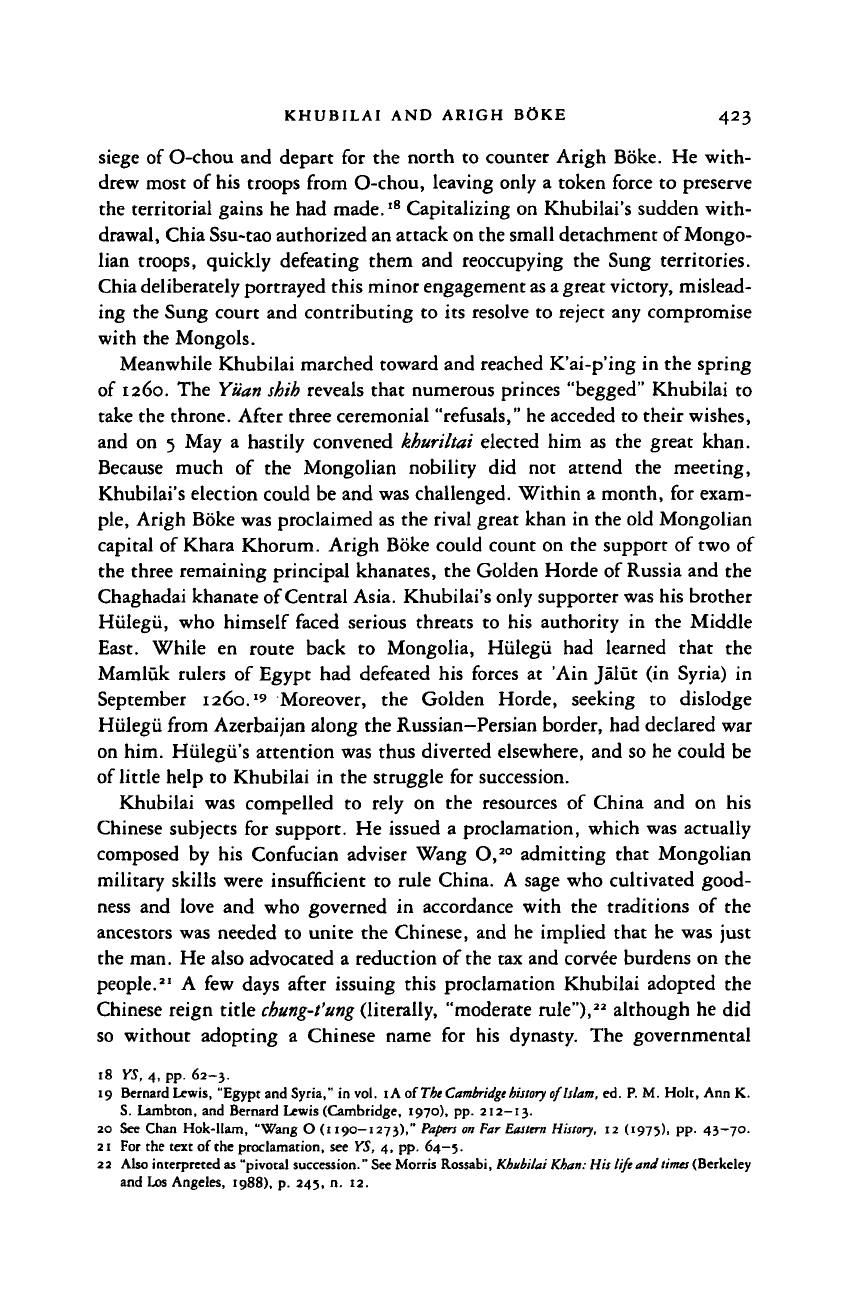
KHUBILAI AND ARIGH BOKE 423
siege of O-chou and depart for the north to counter Arigh Boke. He with-
drew most of his troops from O-chou, leaving only a token force to preserve
the territorial gains he had made.
18
Capitalizing on Khubilai's sudden with-
drawal, Chia Ssu-tao authorized an attack on the small detachment of Mongo-
lian troops, quickly defeating them and reoccupying the Sung territories.
Chia deliberately portrayed this minor engagement
as a
great victory, mislead-
ing the Sung court and contributing to its resolve to reject any compromise
with the Mongols.
Meanwhile Khubilai marched toward and reached K'ai-p'ing in the spring
of 1260. The Yuan
shih
reveals that numerous princes "begged" Khubilai to
take the throne. After three ceremonial "refusals," he acceded to their wishes,
and on 5 May a hastily convened khuriltai elected him as the great khan.
Because much of the Mongolian nobility did not attend the meeting,
Khubilai's election could be and was challenged. Within a month, for exam-
ple,
Arigh Boke was proclaimed as the rival great khan in the old Mongolian
capital of Khara Khorum. Arigh Boke could count on the support of two of
the three remaining principal khanates, the Golden Horde of Russia and the
Chaghadai khanate of Central Asia. Khubilai's only supporter was his brother
Hiilegii, who himself faced serious threats to his authority in the Middle
East. While en route back to Mongolia, Hiilegii had learned that the
Mamluk rulers of Egypt had defeated his forces at 'Ain Jalut (in Syria) in
September
1260.
•»
Moreover, the Golden Horde, seeking to dislodge
Hiilegii from Azerbaijan along the Russian-Persian border, had declared war
on him. Hiilegii's attention was thus diverted elsewhere, and so he could be
of little help to Khubilai in the struggle for succession.
Khubilai was compelled to rely on the resources of China and on his
Chinese subjects for support. He issued a proclamation, which was actually
composed by his Confucian adviser Wang O,
20
admitting that Mongolian
military skills were insufficient to rule China. A sage who cultivated good-
ness and love and who governed in accordance with the traditions of the
ancestors was needed to unite the Chinese, and he implied that he was just
the man. He also advocated a reduction of
the
tax and corvee burdens on the
people." A few days after issuing this proclamation Khubilai adopted the
Chinese reign title
chung-t'ung
(literally, "moderate rule"),
22
although he did
so without adopting a Chinese name for his dynasty. The governmental
18 YS, 4, pp. 62-3.
19 Bernard Lewis, "Egypt and Syria," in vol. iA ofThe
Cambridge history
of
Islam,
ed. P. M. Holt, Ann K.
S. Lambton, and Bernard Lewis (Cambridge, 1970), pp. 212-13.
20 See Chan Hok-Ham, "Wang O (1190—1273),"
Papers
on far
Eastern
History, 12 (1975), pp. 43—70.
21 For the text of the proclamation, see YS, 4, pp. 64—5.
22 Also interpreted as "pivotal succession." See Morris Rossabi, Khubilai Khan: His life and
times
(Berkeley
and Los Angeles, 1988), p. 243, n. 12.
Cambridge Histories Online © Cambridge University Press, 2008
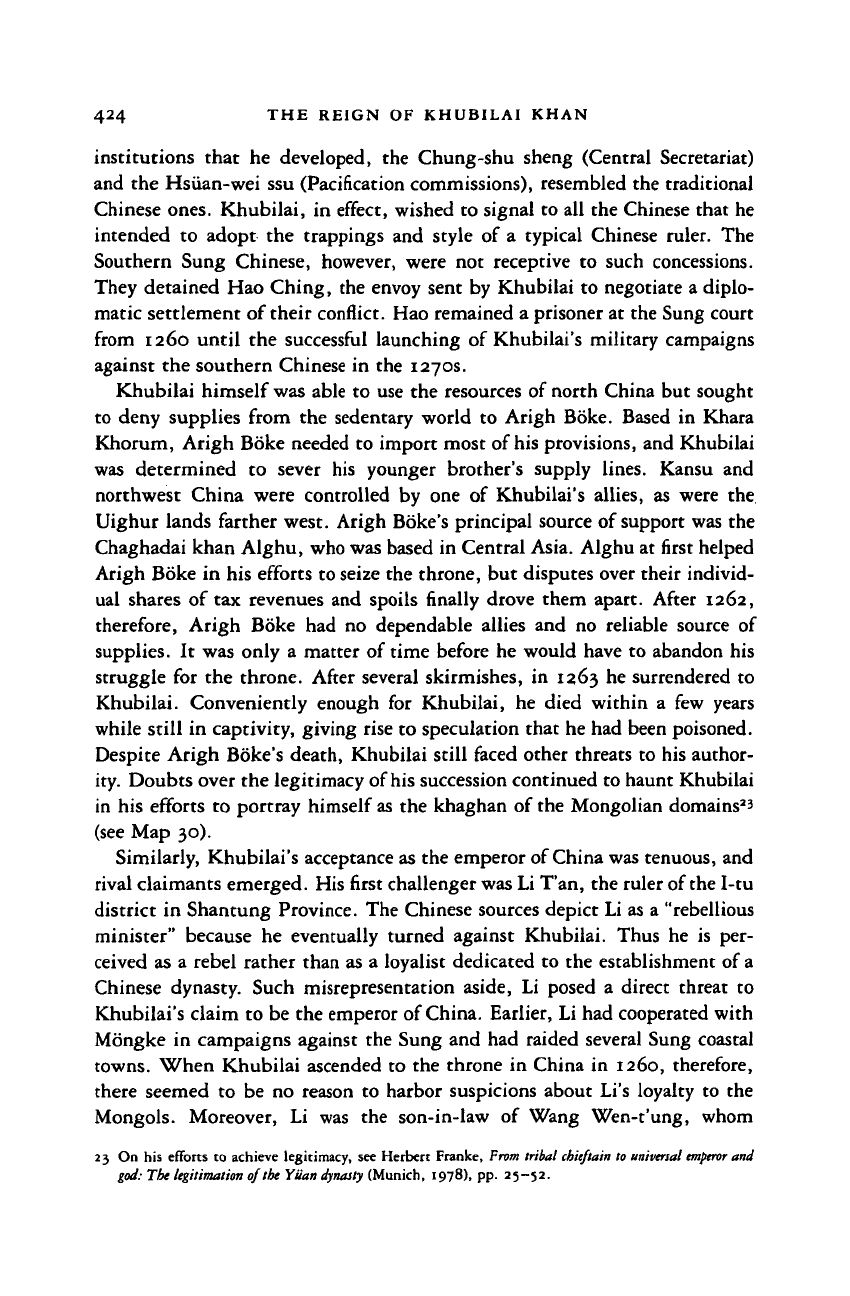
424 THE REIGN OF KHUBILAI KHAN
institutions that he developed, the Chung-shu sheng (Central Secretariat)
and the Hsiian-wei ssu (Pacification commissions), resembled the traditional
Chinese ones. Khubilai, in effect, wished to signal to all the Chinese that he
intended to adopt the trappings and style of a typical Chinese ruler. The
Southern Sung Chinese, however, were not receptive to such concessions.
They detained Hao Ching, the envoy sent by Khubilai to negotiate a diplo-
matic settlement of their conflict. Hao remained a prisoner at the Sung court
from 1260 until the successful launching of Khubilai's military campaigns
against the southern Chinese in the 1270s.
Khubilai himself was able to use the resources of north China but sought
to deny supplies from the sedentary world to Arigh Boke. Based in Khara
Khorum, Arigh Boke needed to import most of
his
provisions, and Khubilai
was determined to sever his younger brother's supply lines. Kansu and
northwest China were controlled by one of Khubilai's allies, as were the
Uighur lands farther west. Arigh Boke's principal source of support was the
Chaghadai khan Alghu, who was based in Central Asia. Alghu at first helped
Arigh Boke in his efforts to seize the throne, but disputes over their individ-
ual shares of tax revenues and spoils finally drove them apart. After 1262,
therefore, Arigh Boke had no dependable allies and no reliable source of
supplies. It was only a matter of time before he would have to abandon his
struggle for the throne. After several skirmishes, in 1263 he surrendered to
Khubilai. Conveniently enough for Khubilai, he died within a few years
while still in captivity, giving rise to speculation that he had been poisoned.
Despite Arigh Boke's death, Khubilai still faced other threats to his author-
ity. Doubts over the legitimacy of his succession continued to haunt Khubilai
in his efforts to portray himself
as
the khaghan of the Mongolian domains
23
(see Map 30).
Similarly, Khubilai's acceptance as the emperor of China was tenuous, and
rival claimants emerged. His first challenger was Li T'an, the ruler of
the
I-tu
district in Shantung Province. The Chinese sources depict Li as a "rebellious
minister" because he eventually turned against Khubilai. Thus he is per-
ceived as a rebel rather than as a loyalist dedicated to the establishment of
a
Chinese dynasty. Such misrepresentation aside, Li posed a direct threat to
Khubilai's claim to be the emperor of
China.
Earlier, Li had cooperated with
Mongke in campaigns against the Sung and had raided several Sung coastal
towns. When Khubilai ascended to the throne in China in 1260, therefore,
there seemed to be no reason to harbor suspicions about Li's loyalty to the
Mongols. Moreover, Li was the son-in-law of Wang Wen-t'ung, whom
23 On his efforts to achieve legitimacy, see Herbert Franke, From tribal chieftain to
universal emperor
and
god: The legitimation of the Yiian dynasty (Munich, 1978), pp. 25-52.
Cambridge Histories Online © Cambridge University Press, 2008
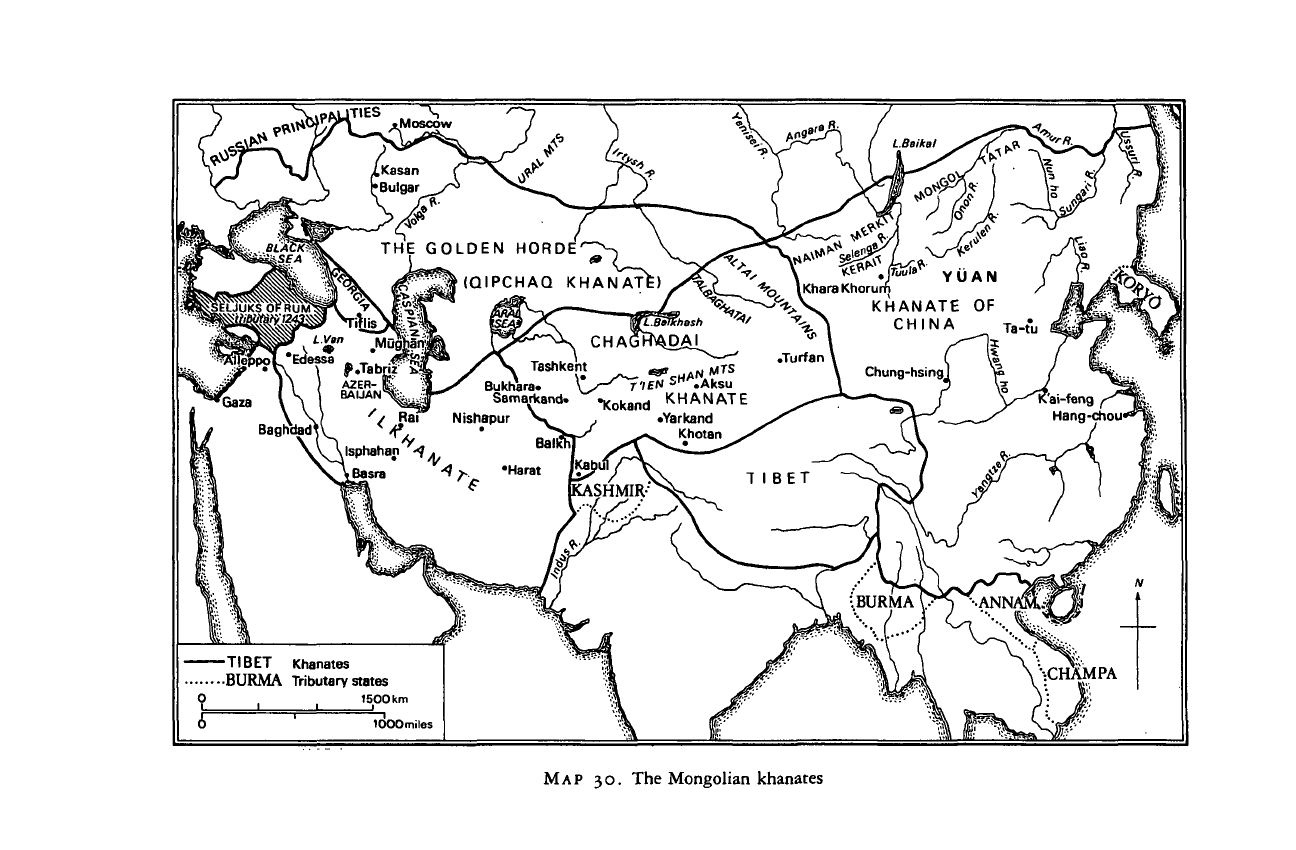
THE GOLDEN HORD
(QIPCHAQ KHANAT
Tashkent
Bukhara.
Samarkand.
"
Vokand
KHANATE
Nishapur
v^ ,
.Yarkand
Khotan
TIBET Khanates
BURMA Tributary states
1500 km
MAP
30. The Mongolian khanates
Cambridge Histories Online © Cambridge University Press, 2008
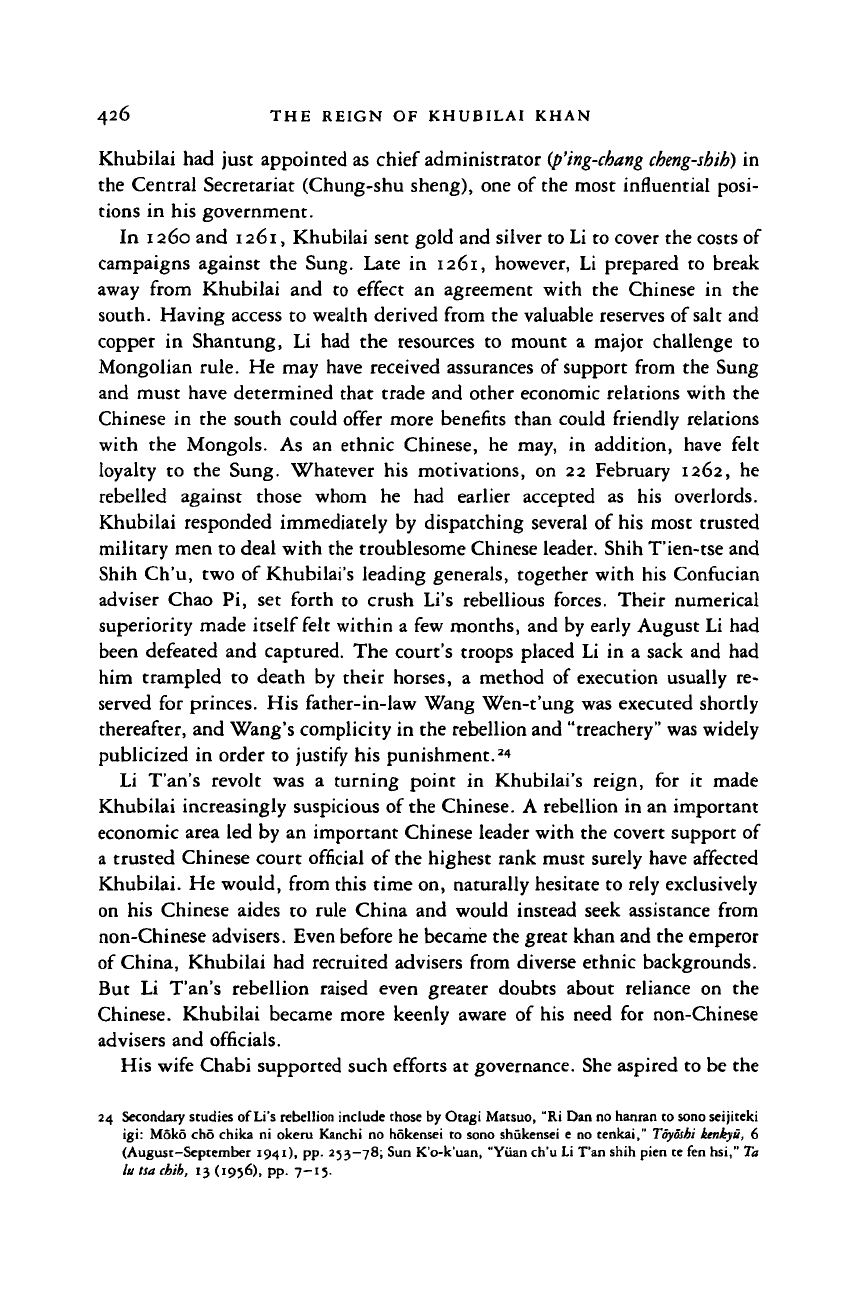
426 THE REIGN OF KHUBILAI KHAN
Khubilai had just appointed as chief administrator
(p'ing-chang cheng-shih)
in
the Central Secretariat (Chung-shu sheng), one of the most influential posi-
tions in his government.
In 1260 and 1261, Khubilai sent gold and silver to Li to cover the costs of
campaigns against the Sung. Late in 1261, however, Li prepared to break
away from Khubilai and to effect an agreement with the Chinese in the
south. Having access to wealth derived from the valuable reserves of salt and
copper in Shantung, Li had the resources to mount a major challenge to
Mongolian rule. He may have received assurances of support from the Sung
and must have determined that trade and other economic relations with the
Chinese in the south could offer more benefits than could friendly relations
with the Mongols. As an ethnic Chinese, he may, in addition, have felt
loyalty to the Sung. Whatever his motivations, on 22 February 1262, he
rebelled against those whom he had earlier accepted as his overlords.
Khubilai responded immediately by dispatching several of his most trusted
military men to deal with the troublesome Chinese leader. Shih T'ien-tse and
Shih Ch'u, two of Khubilai's leading generals, together with his Confucian
adviser Chao Pi, set forth to crush Li's rebellious forces. Their numerical
superiority made itself felt within a few months, and by early August Li had
been defeated and captured. The court's troops placed Li in a sack and had
him trampled to death by their horses, a method of execution usually re-
served for princes. His father-in-law Wang Wen-t'ung was executed shortly
thereafter, and Wang's complicity in the rebellion and "treachery" was widely
publicized in order to justify his punishment.
24
Li T'an's revolt was a turning point in Khubilai's reign, for it made
Khubilai increasingly suspicious of the Chinese. A rebellion in an important
economic area led by an important Chinese leader with the covert support of
a trusted Chinese court official of the highest rank must surely have affected
Khubilai. He would, from this time on, naturally hesitate to rely exclusively
on his Chinese aides to rule China and would instead seek assistance from
non-Chinese advisers. Even before he became the great khan and the emperor
of China, Khubilai had recruited advisers from diverse ethnic backgrounds.
But Li T'an's rebellion raised even greater doubts about reliance on the
Chinese. Khubilai became more keenly aware of his need for non-Chinese
advisers and officials.
His wife Chabi supported such efforts at governance. She aspired to be the
24 Secondary studies of
Li's
rebellion include those by Otagi Matsuo, "Ri Dan no hanran to sono seijiteki
igi: Moko cho chika ni okeru Kanchi no hokensei to sono shukensei e no tcnkai,"
TSyoshi
ktnkyu, 6
(August-September 1941), pp. 253—78; Sun K'o-k'uan, "Yuan ch'u Li T'an shih pien te fen hsi," Ta
lutsachib, 13 (1956), pp. 7—15.
Cambridge Histories Online © Cambridge University Press, 2008
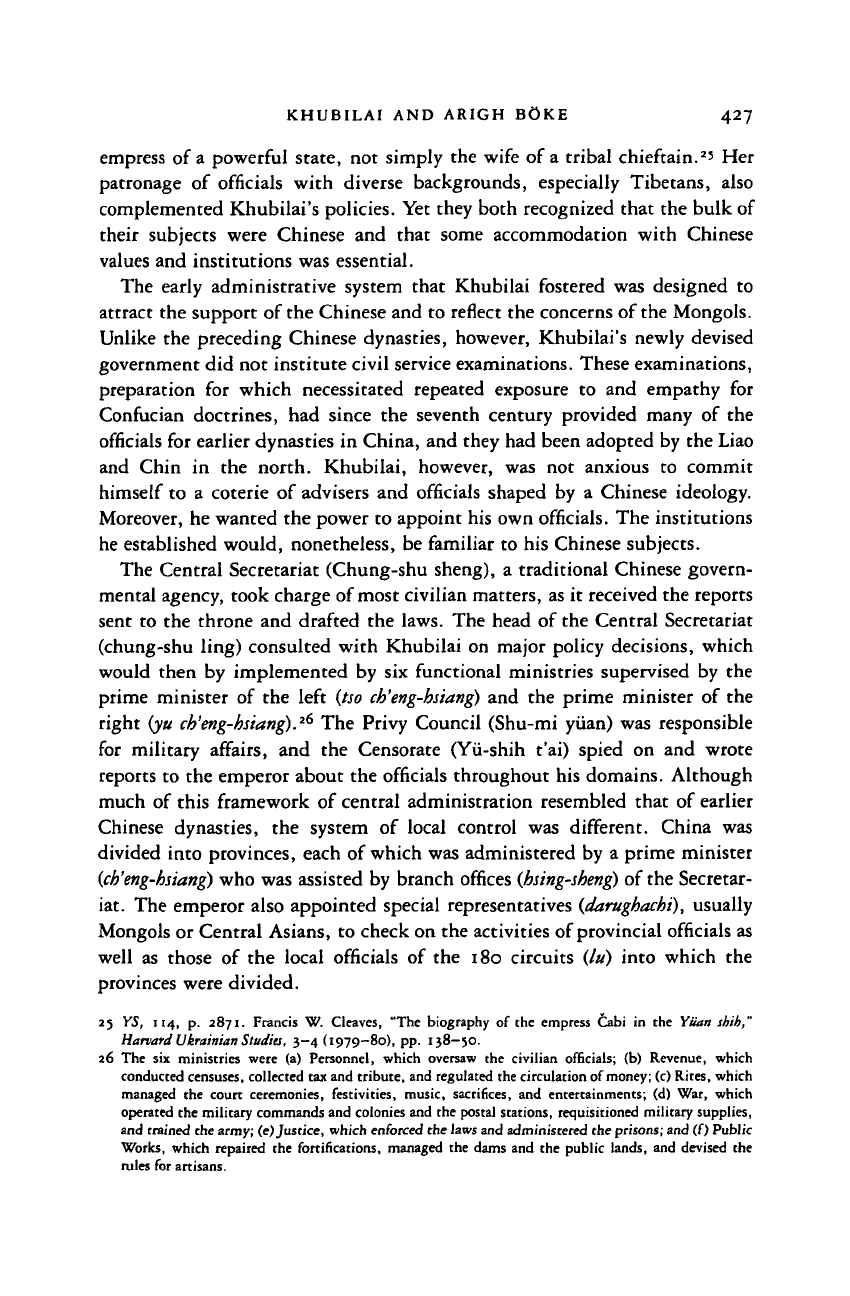
KHUBILAI AND ARIGH BORE 427
empress of a powerful state, not simply the wife of a tribal chieftain.
2
' Her
patronage of officials with diverse backgrounds, especially Tibetans, also
complemented Khubilai's policies. Yet they both recognized that the bulk of
their subjects were Chinese and that some accommodation with Chinese
values and institutions was essential.
The early administrative system that Khubilai fostered was designed to
attract the support of the Chinese and to reflect the concerns of the Mongols.
Unlike the preceding Chinese dynasties, however, Khubilai's newly devised
government did not institute civil service examinations. These examinations,
preparation for which necessitated repeated exposure to and empathy for
Confucian doctrines, had since the seventh century provided many of the
officials for earlier dynasties in China, and they had been adopted by the Liao
and Chin in the north. Khubilai, however, was not anxious to commit
himself to a coterie of advisers and officials shaped by a Chinese ideology.
Moreover, he wanted the power to appoint his own officials. The institutions
he established would, nonetheless, be familiar to his Chinese subjects.
The Central Secretariat (Chung-shu sheng), a traditional Chinese govern-
mental agency, took charge of most civilian matters, as it received the reports
sent to the throne and drafted the laws. The head of the Central Secretariat
(chung-shu ling) consulted with Khubilai on major policy decisions, which
would then by implemented by six functional ministries supervised by the
prime minister of the left (tso
ch'eng-hsiang)
and the prime minister of the
right (yu ch'eng-hsiang).
26
The Privy Council (Shu-mi yuan) was responsible
for military affairs, and the Censorate (Yii-shih t'ai) spied on and wrote
reports to the emperor about the officials throughout his domains. Although
much of this framework of central administration resembled that of earlier
Chinese dynasties, the system of local control was different. China was
divided into provinces, each of which was administered by a prime minister
{ch'eng-hsiang)
who was assisted by branch offices
(hsing-sheng)
of the Secretar-
iat. The emperor also appointed special representatives
(darughachi),
usually
Mongols or Central Asians, to check on the activities of provincial officials as
well as those of the local officials of the 180 circuits (/«) into which the
provinces were divided.
25 KJ, 114, p. 2871. Francis W. Cleaves, "The biography of the empress Cabi in the Yuan shib,"
Harvard Ukrainian Studies, 3-4 (1979—80), pp. 138—50.
26 The six ministries were (a) Personnel, which oversaw the civilian officials; (b) Revenue, which
conducted censuses, collected tax and tribute, and regulated the circulation of money; (c) Rites, which
managed the court ceremonies, festivities, music, sacrifices, and entertainments; (d) War, which
operated the military commands and colonies and the postal stations, requisitioned military supplies,
and trained the army; (e) Justice, which enforced the laws and administered the prisons; and (f) Public
Works, which repaired the fortifications, managed the dams and the public lands, and devised the
rules for artisans.
Cambridge Histories Online © Cambridge University Press, 2008
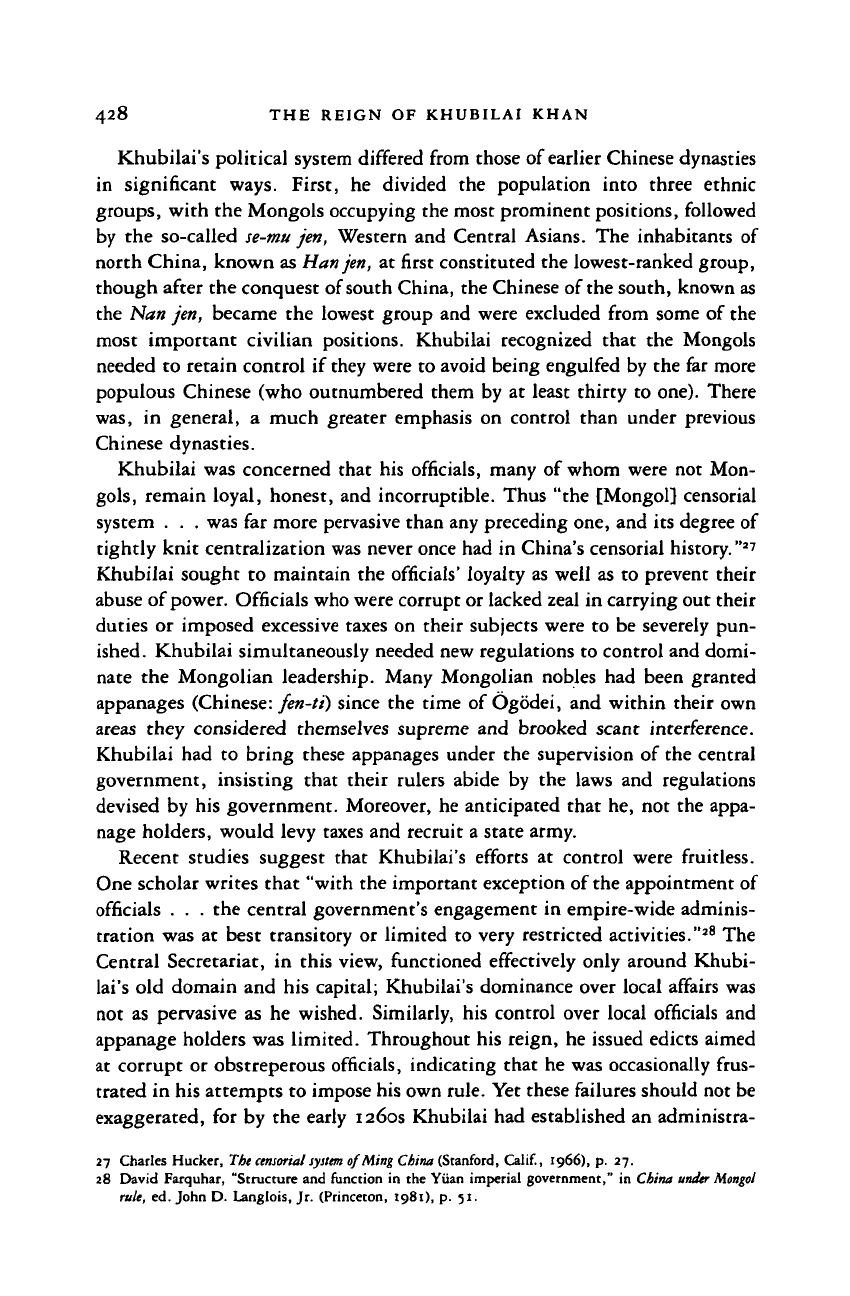
428 THE REIGN OF KHUBILAI KHAN
Khubilai's political system differed from those of earlier Chinese dynasties
in significant ways. First, he divided the population into three ethnic
groups, with the Mongols occupying the most prominent positions, followed
by the so-called
se-mu
jen, Western and Central Asians. The inhabitants of
north China, known as Han
jen,
at first constituted the lowest-ranked group,
though after the conquest of south China, the Chinese of the south, known as
the Nan jen, became the lowest group and were excluded from some of the
most important civilian positions. Khubilai recognized that the Mongols
needed to retain control if they were to avoid being engulfed by the far more
populous Chinese (who outnumbered them by at least thirty to one). There
was,
in general, a much greater emphasis on control than under previous
Chinese dynasties.
Khubilai was concerned that his officials, many of whom were not Mon-
gols,
remain loyal, honest, and incorruptible. Thus "the [Mongol] censorial
system . . . was far more pervasive than any preceding one, and its degree of
tightly knit centralization was never once had in China's censorial
history.
"
21
Khubilai sought to maintain the officials' loyalty as well as to prevent their
abuse of power. Officials who were corrupt or lacked zeal in carrying out their
duties or imposed excessive taxes on their subjects were to be severely pun-
ished. Khubilai simultaneously needed new regulations to control and domi-
nate the Mongolian leadership. Many Mongolian nobles had been granted
appanages (Chinese: fen-ti) since the time of Ogodei, and within their own
areas they considered themselves supreme and brooked scant interference.
Khubilai had to bring these appanages under the supervision of the central
government, insisting that their rulers abide by the laws and regulations
devised by his government. Moreover, he anticipated that he, not the appa-
nage holders, would levy taxes and recruit a state army.
Recent studies suggest that Khubilai's efforts at control were fruitless.
One scholar writes that "with the important exception of the appointment of
officials . . . the central government's engagement in empire-wide adminis-
tration was at best transitory or limited to very restricted activities."
38
The
Central Secretariat, in this view, functioned effectively only around Khubi-
lai's old domain and his capital; Khubilai's dominance over local affairs was
not as pervasive as he wished. Similarly, his control over local officials and
appanage holders was limited. Throughout his reign, he issued edicts aimed
at corrupt or obstreperous officials, indicating that he was occasionally frus-
trated in his attempts to impose his own rule. Yet these failures should not be
exaggerated, for by the early 1260s Khubilai had established an administra-
27 Charles Hucker,
The censorial system
of Ming
China
(Stanford,
Calif.,
1966), p. 27.
28 David Farquhar, "Structure and function in the Yuan imperial government," in China
under Mongol
rule, ed. John D. Langlois, Jr. (Princeton, 1981), p. 51.
Cambridge Histories Online © Cambridge University Press, 2008
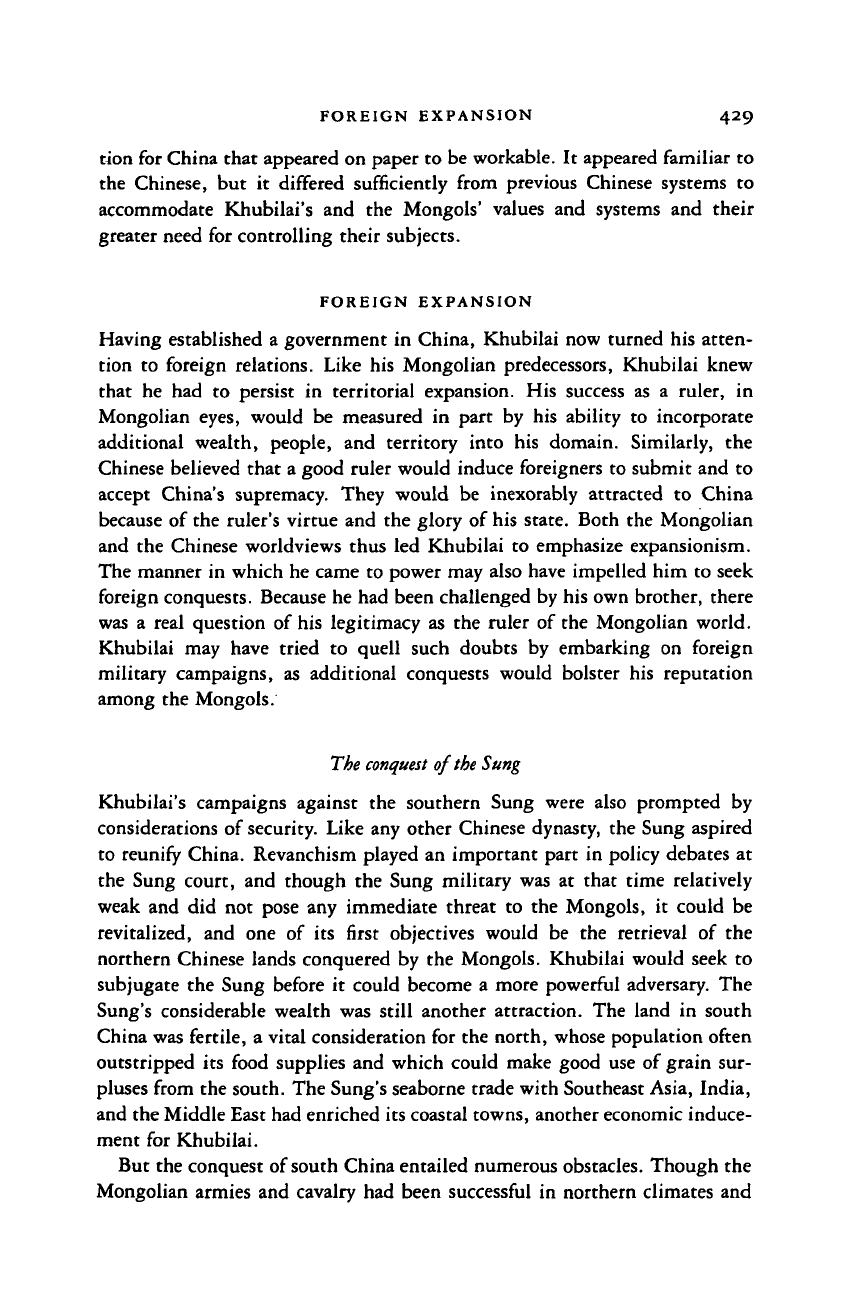
FOREIGN EXPANSION 429
tton for China that appeared on paper
to
be workable.
It
appeared familiar
to
the Chinese,
but it
differed sufficiently from previous Chinese systems
to
accommodate Khubilai's
and the
Mongols' values
and
systems
and
their
greater need
for
controlling their subjects.
FOREIGN EXPANSION
Having established a government
in
China, Khubilai now turned
his
atten-
tion
to
foreign relations. Like
his
Mongolian predecessors, Khubilai knew
that
he had to
persist
in
territorial expansion.
His
success
as a
ruler,
in
Mongolian eyes, would
be
measured
in
part
by his
ability
to
incorporate
additional wealth, people,
and
territory into
his
domain. Similarly,
the
Chinese believed that a good ruler would induce foreigners
to
submit and
to
accept China's supremacy. They would
be
inexorably attracted
to
China
because
of
the ruler's virtue
and the
glory
of
his state. Both
the
Mongolian
and
the
Chinese worldviews thus
led
Khubilai
to
emphasize expansionism.
The manner
in
which
he
came
to
power may also have impelled
him to
seek
foreign conquests. Because he had been challenged by his own brother, there
was
a
real question
of
his legitimacy
as the
ruler
of
the Mongolian world.
Khubilai
may
have tried
to
quell such doubts
by
embarking
on
foreign
military campaigns,
as
additional conquests would bolster
his
reputation
among the Mongols.
The conquest
of
the Sung
Khubilai's campaigns against
the
southern Sung were also prompted
by
considerations
of
security. Like any other Chinese dynasty, the Sung aspired
to reunify China. Revanchism played
an
important part
in
policy debates
at
the Sung court,
and
though
the
Sung military
was
at
that time relatively
weak
and
did not
pose
any
immediate threat
to
the
Mongols,
it
could
be
revitalized,
and one of its
first objectives would
be the
retrieval
of the
northern Chinese lands conquered
by the
Mongols. Khubilai would seek
to
subjugate
the
Sung before
it
could become
a
more powerful adversary.
The
Sung's considerable wealth
was
still another attraction.
The
land
in
south
China was fertile,
a
vital consideration
for
the north, whose population often
outstripped
its
food supplies
and
which could make good use
of
grain
sur-
pluses from the south. The Sung's seaborne trade with Southeast Asia, India,
and the Middle East had enriched its coastal towns, another economic induce-
ment
for
Khubilai.
But the conquest of south China entailed numerous obstacles. Though
the
Mongolian armies
and
cavalry
had
been successful
in
northern climates
and
Cambridge Histories Online © Cambridge University Press, 2008
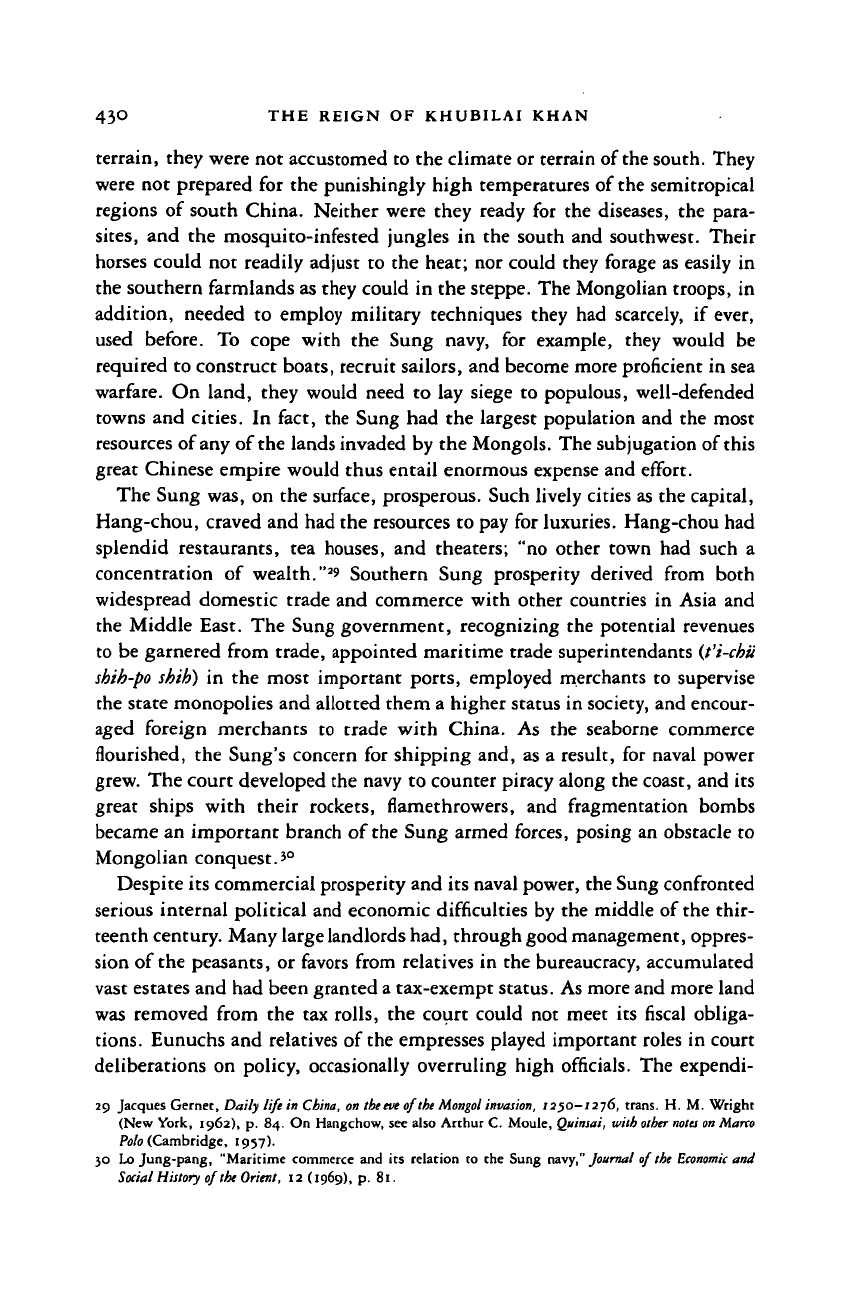
43° THE REIGN OF KHUBILAI KHAN
terrain, they were not accustomed to the climate or terrain of
the
south. They
were not prepared for the punishingly high temperatures of the semitropical
regions of south China. Neither were they ready for the diseases, the para-
sites,
and the mosquito-infested jungles in the south and southwest. Their
horses could not readily adjust to the heat; nor could they forage as easily in
the southern farmlands as they could in the steppe. The Mongolian troops, in
addition, needed to employ military techniques they had scarcely, if ever,
used before. To cope with the Sung navy, for example, they would be
required to construct boats, recruit sailors, and become more proficient in sea
warfare. On land, they would need to lay siege to populous, well-defended
towns and cities. In fact, the Sung had the largest population and the most
resources of any of
the
lands invaded by the Mongols. The subjugation of this
great Chinese empire would thus entail enormous expense and effort.
The Sung was, on the surface, prosperous. Such lively cities as the capital,
Hang-chou, craved and had the resources to pay for luxuries. Hang-chou had
splendid restaurants, tea houses, and theaters; "no other town had such a
concentration of wealth."
2
' Southern Sung prosperity derived from both
widespread domestic trade and commerce with other countries in Asia and
the Middle East. The Sung government, recognizing the potential revenues
to be garnered from trade, appointed maritime trade superintendants
(t'i-chii
shih-po sbih)
in the most important ports, employed merchants to supervise
the state monopolies and allotted them a higher status in society, and encour-
aged foreign merchants to trade with China. As the seaborne commerce
flourished, the Sung's concern for shipping and, as a result, for naval power
grew. The court developed the navy to counter piracy along the coast, and its
great ships with their rockets, flamethrowers, and fragmentation bombs
became an important branch of the Sung armed forces, posing an obstacle to
Mongolian conquest.'
0
Despite its commercial prosperity and its naval power, the Sung confronted
serious internal political and economic difficulties by the middle of the thir-
teenth century. Many
large
landlords had, through good management, oppres-
sion of the peasants, or favors from relatives in the bureaucracy, accumulated
vast estates and had been granted
a
tax-exempt status. As more and more land
was removed from the tax rolls, the court could not meet its fiscal obliga-
tions.
Eunuchs and relatives of the empresses played important roles in court
deliberations on policy, occasionally overruling high officials. The expendi-
29 Jacques Gernec, Daily life in China, on the
eve
of the Mongol invasion, 1250-1276, trans. H. M. Wright
(New York, 1962), p. 84. On Hangchow, see also Arthur C. Moule, Quinsai, with other
notes
on Marco
Polo
(Cambridge, 1957).
30 Lo Jung-pang, "Maritime commerce and its relation to the Sung navy," Journal of the
Economic
and
Social History of the Orient, 12 (1969), p. 81.
Cambridge Histories Online © Cambridge University Press, 2008
